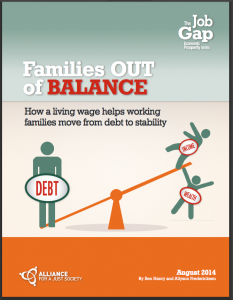 August 26, 2014
Contact: Kathy Mulady
(206) 992-8787
kathy@allianceforajustsociety.org
August 26, 2014
Contact: Kathy Mulady
(206) 992-8787
kathy@allianceforajustsociety.org
Read the Families Out of Balance report here.
Low-income families are already struggling to meet basic needs. Factor in suffocating household debt, and it is clear that families not making a living wage have little chance of building for the future.
As the gap between minimum wages and living wages continues to grow, we find that low-income households face a disproportionate debt burden — to an alarming degree. Families are forced to navigate a system that sets them up to fail, resulting in painful kitchen table conversations as households confront impossible balance sheets.
Job Gap: Families Out of Balance, produced by the Alliance for a Just Society, is the first report in the Alliance’s 2014 Job Gap Economic Prosperity Series. This study examines just what it takes to move beyond living paycheck-to-paycheck and the challenges that low-income families burdened with debt face.
The report also includes living wage findings for five household types in 10 states and in New York City. The Alliance has produced a Job Gap Study on jobs and wages since 1999.
Alliance research figured prominently in the successful $15 minimum wage fight in Seattle last spring. Jill Reese, associate director at the Alliance for a Just Society and a leader on income inequality issues, participated in panels and met with the Mayor’s Income Inequality Advisory Committee.
“These findings paint a clear picture of the disproportionate debt burden shouldered by families making less than a living wage,” Reese said. “These are indicators of larger systemic inequities, and inaction by policymakers around the country is, quite frankly, unacceptable.
“Legislators in states and in Congress must step up now and make investments that help families gain a foothold,” she said.
Key national findings in the 2014 report include:
- Low-income households bear a dramatically disproportionate debt burden. They are less likely to be able to pay off what they owe. The low-income group has $15.64 in income for every $1 of debt, while more affluent workers have $32.42 for every $1 of debt.
- Low-income households making less than $15 an hour are 71 percent more likely to be unable to save than higher incomes. Having nothing to fall back on in emergencies means more debt. It’s expensive to be poor.
- Nine of 10 low-income households make debt payments a priority, making payments within 60 days of the due date — often skipping meals or turning off the heat in winter to do so.
- A lack of state investment in higher education means increasing tuition costs and a greater toll on low-income students. For every $1 in student loan debt, the low-income group has $4.18 in income to pay it off, while the higher-income group has $13.24.
- The living wage for a single person ranges from $14.40 per hour in Montana to $22.49 per hour in New York City.
- The living wage for a single adult with a school age child and a toddler ranges from $25.12 per hour in Idaho to $40.66 per hour in New York City.
The report calls on policymakers to:
- Reinvest in higher education
- Expand Medicaid eligibility
- Regulate payday lending
- Increase the federal minimum wage
- Abolish the federal tipped minimum wage
Job Gap: Families Out of Balance includes personal stories from working families throughout the country struggling to make ends meet. We are happy to help you contact families willing to share their experiences. Some of the stories include:
- A Washington state woman who lost her job went back to school, hoping to improve her job outlook. Then disaster struck, as her husband got sick and died. She couldn’t finish college and is now saddled with his medical debt and her own student debt. She still works a low-paying job and cuts essentials to keep up with the bills.
- A Montana woman with a master’s degree in environmental science hasn’t found work in her field. She is struggling to pay her student loan bills, while working in a coffee shop for minimum wage. “I’ve been looking for jobs all over the country. I’ve always been driven. Now I feel like I’ve hit a dead end.”
- A young man in Idaho earns $12 an hour working full-time as a heavy truck tire tech He supports his wife, who works part-time, and their new baby. They live with roommates who help pay the rent. Childcare eats up most of the income from his wife’s job. She needs dental work, but they can’t afford it.
The study’s authors, Ben Henry and Allyson Fredericksen, are available to discuss the report findings. The complete report can be found at www.thejobgap.org
The Alliance for a Just Society is a national research, policy and organizing network that focuses on health, racial and economic justice issues. The Alliance is based in Seattle.